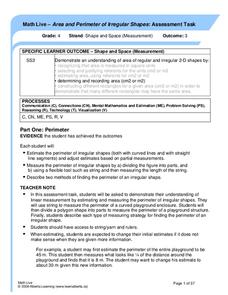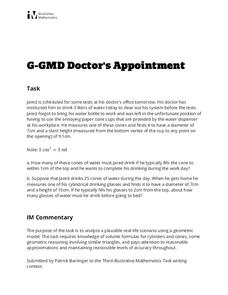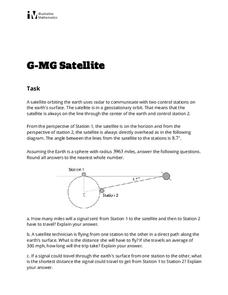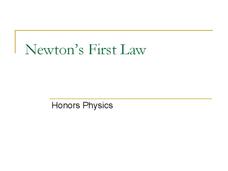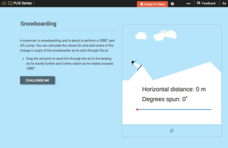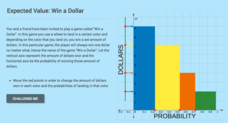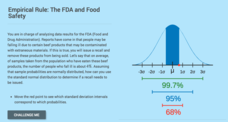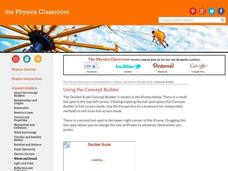Illustrative Mathematics
Comparing Years
Who knew that the Egyptian, Julian, and Gregorian year were different lengths? Your mathematicians will! They will have to calculate the difference between the years in seconds and find the percent change. Using dimensional analysis,...
Illustrative Mathematics
Selling Computers
A quick activity to test your learners' knowledge of percent increase. When an electronic store needs a 30% increase in computer sales, your mathematicians must calculate how many computers they need to sell next month.
Illustrative Mathematics
Tossing Cylinders
Everyone loves a lesson that involves throwing things around! To understand probability, your experimenters will predict how different cylinder-shaped objects will land when tossed. When the data is collected, they will calculate the...
Illustrative Mathematics
Offensive Linemen
Comparing college football teams, Division I is said to have heavier lineman than Division III. Your mathematicians are given data from two different divisions and will have to interpret a dotplot and calculate the difference in weight...
Baylor College
Calculating Exponential Growth
There can be a steep learning curve when teaching about exponential growth, but the lesson helps kids make sense out of the concept. When talking about exponential growth of viruses, learners may not be very interested, but when you are...
Kuta Software
Polygons and Angles
Get out those protractors! Geometers measure interior and exterior angles of 10 polygons, including a 24-gon. They also calculate the interior angle sum of the polygons.
Alberta Learning
Area and Perimeter of Irregular Shapes
Evaluate young mathematicians' understanding of area and perimeter with this series of three assessment tasks. Challenging students to not only calculate the area and perimeter of irregular shapes, but to explain in writing their...
Illustrative Mathematics
Doctor's Appointment
Geometric volume calculations are brought into the real world in a quick set of application problems. Learners are asked to help a patient figure out how to drink a prescribed amount of water both at work and at home. This activity...
Illustrative Mathematics
Satellite
Learners practice relating rules of trigonometry and properties of circles. With a few simplifying assumptions such as a perfectly round earth, young mathematicians calculate the lengths of various paths between satellite and...
Benjamin Franklin High School
Saxon Math: Algebra 2 (Section 4)
This fourth of twelve units in a series continues the investigation of functions through equations and inequalities. However, the modular nature of the lessons in the section make this an excellent resource for any curriculum...
Benjamin Franklin High School
Saxon Math: Algebra 2 (Section 3)
In this third of a twelve-part series, the focus moves from using matrices to solving systems of equations with substitution and elimination, including more than two dimensions and variables in equations, and analyzing statistical data....
Illustrative Mathematics
But Mango Is My Favorite...
Opening up a package of fruit snacks is like a box of chocolates, you never know what you're going to get. When all the mango flavored ones are missing, learners calculate the probability that one bag versus the whole box is missing the...
WindWise Education
When is a Wind Farm a Good Investment?
When will a wind farm pay for itself? Individuals calculate the anticipated annual revenue for two proposed wind farms. By comparing the number of years it takes to pay back the initial investment, they determine which site makes the...
Illustrative Mathematics
Temperature Conversions
Complete two conversions at once using compositions. Pupils use the conversion formulas for temperatures to calculate a formula to convert directly between Kelvin and Fahrenheit. Classmates determine the meanings of composition...
Bowels Physics
Newton's First Law
Force acts on objects in mysterious ways ... until now! A comprehensive presentation explains the balance of forces acting on objects. Learners draw free body diagrams to show these invisible forces and make force calculations.
CK-12 Foundation
Pythagorean Theorem to Determine Distance: Tree Shadows
Why is that shadow getting longer? Determine the changes in the length of a shadow as the sun changes position in the sky. Individuals use an interactive to calculate the length of a shadow at different times during the day via the...
CK-12 Foundation
Trigonometric Functions of Angles Greater than 360 Degrees: Snowboarding
Spin through the trigonometric functions. Scholars determine the angle of rotation a snowboarding snowman makes at various distances in his jump. The class members then calculate the values of trigonometric functions for those angles.
CK-12 Foundation
Counting Events: Flipping Unfair Coins
Who said life was fair? An interactive uses an area diagram to represent the probabilities of flipping unfair coins. Pupils use the diagram to calculate the probabilities of outcomes of flipping the two coins. The scholars must decide...
CK-12 Foundation
Expected Value: Win a Dollar
Spin a wheel, land on a color ... and win. Learners create a graph to display the probabilities of the amount of money they can win by spinning a colored wheel. The pupils use the dollar amounts and their probabilities to calculate the...
CK-12 Foundation
Computing Probabilities for the Standard Normal Distribution: The FDA and Food Safety
To recall or not to recall, that is the question. Using provided data, pupils calculate the percent of people that may fall ill on average. The scholars determine the standard deviation based upon the mean and the empirical rule,...
CK-12 Foundation
Volume by Cross Section: Volume of the Cone
Discover another way to find the volume of a cone. Pupils explore how the area of a cross section changes as it moves through a cone. The interactive uses that knowledge to develop the integral to use to find the volume of the cone....
Royal Society of Chemistry
Aspirin—The Wonder of Medicine
What do aspirin and the willow tree have in common? Scholars of chemical synthesis engage in a fascinating reaction to make their own aspirin samples. The lab uses thin layer chromatography analysis, includes stoichiometric calculations,...
Physics Classroom
Decibel Scale
Turn it up! Sound scientists explore the decibel scale through an interactive that calculates movement up and down the scale. Part of a series of interactives that explore sounds and waves, the resource includes a help feature to support...
Physics Classroom
Name That Harmonic: Strings
Don't string your class along! Physics scholars discover the fascinating forces behind the music of stringed instruments using an interactive. From a series covering sounds and waves, the interactive asks users to identify nodes and...
Other popular searches
- Calculator Skills
- Ti 83 Graphing Calculator
- Using a Calculator
- Calculator Activities
- Calculator Math
- Calculator Math Games
- Graphing Calculators
- Algebra Graphing Calculator
- Calculator Lessons
- Computer Calculator
- Ti Explorer Calculator
- Graphing Calculator Activity






